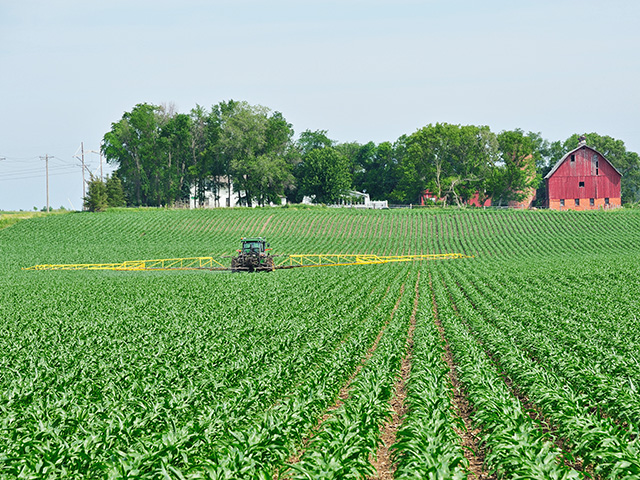Sprayer Ownership vs. Custom Application: Evaluate Trade-offs

Deciding between investing in your own self-propelled sprayer or relying on a custom applicator requires evaluating multiple factors beyond how many acres you farm.
First and foremost, you need to explore spraying timeliness and labor considerations before any price shopping begins. Also, factor in which tasks the machine will perform beyond weed control, such as in-season fertility, insect control, multiple fungicide sprays and maybe even cover crop application. Do your business and team have the chemical knowledge, buying savvy, risk aversion, mechanical prowess and proper pesticide/equipment storage facility? And what about considering custom application for neighbors to reduce your costs or sharing ownership with another farmer?
“There are several critical factors besides farm size when you compare sprayer ownership with custom application,” says Michael Langemeier, Purdue University ag economist. “Obviously, there’s the total trips across each acre and the number of hours by task. Then factor in the life of a new or used self-propelled sprayer and its value at the end of its useful life.”
Langemeier suggests using Machinery Pete or other online buying resources to gauge sprayer pricing, hours and potential salvage values. “I also think dealers would be pretty open to sharing how long sprayers will last given acres sprayed annually,” he says.
A significant trade-off with sprayer ownership compared with custom application is finding labor. Langemeier says it takes at least one employee or family member dedicated to the sprayer, mobile water/chemical tender and crop scouting, because some applications occur during tillage, planting and harvest. In addition, in-season weed control, disease and insect control, and nitrogen applications or cover crops are less effective if not applied in a timely manner.
Conversely, sprayer ownership with dedicated labor can provide better timeliness and attention to detail compared with a busy custom applicator. “If you have a fairly large farm, owning a sprayer that can optimize timing is a powerful business investment,” Langemeier says.
For example, consider a decision on whether to use a fungicide. “Our Purdue agronomists always talk about the importance of field scouting to ensure you have leaf diseases,” he says. “You can’t call a custom applicator and schedule an application for tomorrow. It may be sometime next week. There’s no wait time when you own a sprayer.”

Langemeier emphasizes the importance of pricing out numerous business scenarios when trying to justify a sprayer investment. For example, what happens if interest rates hit 9% or they drop to 7%? What if labor takes two employees instead of one? What if you add a granular applicator? How much custom business (added time and expense) might fit without interfering with existing acres?
Evaluate custom rates as both a cost (if you hire a custom applicator) and potential income (neighbors hire you to spray) in your decision-making process. If you don’t have actual custom application costs from last year for comparison, you can ballpark your scenarios by using rates compiled by Iowa State University. According to the 2022 Iowa Farm Custom Rate Survey, custom charges for self-propelled spraying ranged from $5 to $12 per acre, with an average of $7.80 per acre and a median charge of $8 per acre.
If you’re considering a high-clearance sprayer to replace aerial application, custom rates ranged from $8 to $11 per acre, with an average of $9.70 per acre and median charge of $10 per acre. New numbers for 2023 will be published in mid-March.
On the flip side, hiring a qualified custom application generally removes many economic and agronomic risks like drift and misapplication, product usage and certifications, equipment costs and maintenance, detailed record-keeping, and time and labor management.
Accelerated depreciation offers tax advantages to help pay for the machine, especially when coming off a strong income year. “This aspect shouldn’t be the driving reason for purchase, as a sprayer decision should be based on economic efficiencies it can create for the overall business,” Langemeier says. “And that benefit must be calculated against custom application costs that are completely deductible.”
Remember to price various sprayer add-ons and technologies. What is desired versus what will pay for itself, like nozzle shutoff and auto-steer?
“One of the latest developments is the technology that distinguishes between the weed and the crop, only turning on to spray the weed (Smart Sprayer Technology). “While it’s currently very expensive, if you can cut herbicide input costs by 70%, it is worth considering because you gain environmental benefits as well,” Langemeier added.
For more details on calculating machinery costs, check out these links:
Content provided by DTN/The Progressive Farmer
Find expert insights on agronomics, crop protection, farm operations and more.